Two previous full-term pregnancies without complications led Tracey Klinge to believe her third pregnancy would be smooth sailing as well. But in the spring of 2018 when she and her husband Kris went for a heartbeat confirmation appointment at 8 weeks, they knew something wasn’t right. The sonogram showed no signs of a fetal heartbeat. The pregnancy ultimately ended in a miscarriage, and it wouldn’t be the couple’s last.
On January 1, 2019, Tracey got the news of yet another miscarriage. And she’d have two more chemical pregnancies that year. With her emotions running high, she made the decision to try one more time. To her shock, the pregnancy test came back positive. What’s more, a sonogram would soon reveal two heartbeats. On January 1, 2020, the Klinges were ready to announce to family and friends that they were pregnant with rainbow baby twins.
A Surprising OB Appointment
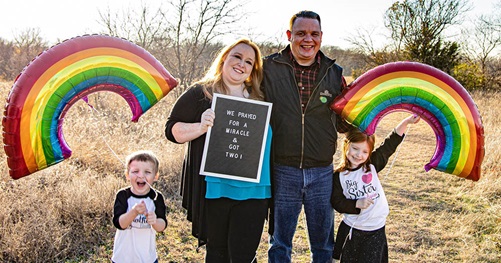 The pregnancy would prove to be much more difficult than Tracey’s previous two. She was tired throughout the pregnancy, swelling was an issue and incredibly nauseous. “At 32 weeks, I told Kris I didn’t think I should drive any more. My hands were so swollen and my stomach was so big, it didn’t seem safe,” Tracey said.
The pregnancy would prove to be much more difficult than Tracey’s previous two. She was tired throughout the pregnancy, swelling was an issue and incredibly nauseous. “At 32 weeks, I told Kris I didn’t think I should drive any more. My hands were so swollen and my stomach was so big, it didn’t seem safe,” Tracey said.
It was in the height of COVID-19 and Tracey was due for her next appointment with John Bertrand, M.D., of Walnut Hill OB/GYN, and on the medical staff of Texas Health Dallas. Kris and the Klinge’s two children, Hannah and Hunter, who were being homeschooled at the time, waited in the car during the appointment. In the doctor’s office, Tracey’s blood pressure was dangerously high. She took off her mask for a moment to get some fresh air while awaiting Dr. Bertrand. As he entered, he immediately commented that her face looked extremely swollen.
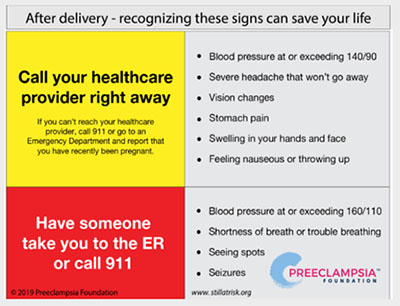 “I’ve known Tracey through her two previous pregnancies, and looking at her I knew her swelling had increased dramatically, and paired with her high blood pressure, protein in her urine, and hyper reflexes, I knew she was experiencing preeclampsia” said Dr. Bertrand.
“I’ve known Tracey through her two previous pregnancies, and looking at her I knew her swelling had increased dramatically, and paired with her high blood pressure, protein in her urine, and hyper reflexes, I knew she was experiencing preeclampsia” said Dr. Bertrand.
Preeclampsia is a serious disorder that develops when women have persistent high blood pressure usually in the last months of pregnancy. When preeclampsia is suspected, the healthcare provider will watch for signs of instability in the mother, including very high blood pressure that’s not responding to medications, signs the kidneys and/or liver are failing, and a reduced number of red blood cells or platelets. Providers also watch closely for indications of an impending seizure or signs the brain is about stroke.
Tracey was sent directly to Labor and Delivery Unit at Texas Health Dallas, which is a Level IV maternal care facility, the highest designation by the Texas Health Department of State Health Services. There she was admitted for close monitoring and was put on a magnesium sulfate to help stabilize her blood pressure and prevent seizures. She was given steroid shots to help speed up the development of the babies’ lungs. The plan was to deliver the next morning, so Kris rushed back to their home in Frisco to pack a bag for Tracey, get the kids squared away with relatives and let friends know what was going on.
However, despite the medications, Tracey’s blood pressure continued to dangerously climb, and the doctors made the decision that the babies needed to be delivered immediately. Kris made it back to the hospital just as Tracey was being whisked into surgery.
Baby Hudson was delivered first, at 4 lbs., 12 oz. Baby Heidi weighed in at 3 lbs., 15 oz. Both were taken to the hospital’s Level III Neonatal Intensive Care Unit (NICU) and needed help in breathing.
Not Out of the Woods
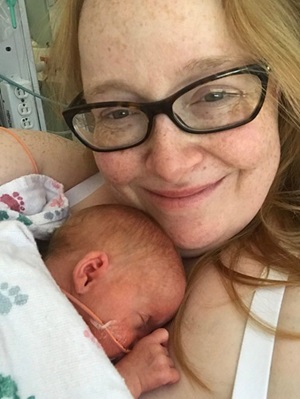 Four days after Tracey gave birth to the twins, she was discharged from the hospital. By midnight that same night, she awoke not feeling quite right. Upon checking her blood pressure, she noticed it was high. She couldn’t catch her breath and it hurt to lie down. She feared she was having a heart attack.
Four days after Tracey gave birth to the twins, she was discharged from the hospital. By midnight that same night, she awoke not feeling quite right. Upon checking her blood pressure, she noticed it was high. She couldn’t catch her breath and it hurt to lie down. She feared she was having a heart attack.
Around 1a.m. Tracey called Walnut Hill OB/GYN and spoke to Jane Nokleberg, M.D., on the medical staff of Texas Health Dallas. Dr. Nockleburg advised her to immediately go to the Emergency Room. Once there, Tracey learned that her preeclampsia had returned.
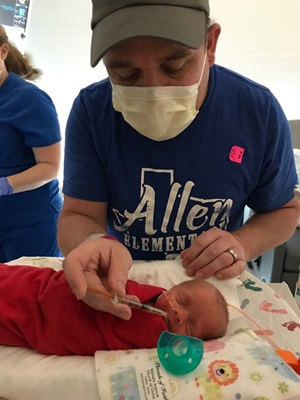 Most women will give birth and fully recover from their preeclampsia, however some will experience complications up to 6 weeks after the birth. According to the Preeclampsia Foundation, any woman can develop preeclampsia after her baby is born, whether she experienced high blood pressure during her pregnancy or not. Moms need to continue to monitor their health after delivery.
Most women will give birth and fully recover from their preeclampsia, however some will experience complications up to 6 weeks after the birth. According to the Preeclampsia Foundation, any woman can develop preeclampsia after her baby is born, whether she experienced high blood pressure during her pregnancy or not. Moms need to continue to monitor their health after delivery.
In Tracey’s case, the preeclampsia was causing pulmonary edema, a condition that is caused by excess fluid in the lungs, which is why she couldn’t catch her breath. In many cases, heart problems cause pulmonary edema, and doctors were fearful that the additional fluid was putting too much pressure on her heart, potentially causing heart failure. Tracey was admitted to the Texas Health Dallas heart unit for monitoring and treatment.
She was put back on magnesium sulfate and given medication to help decrease the excess fluid in her body. After a few days, all the tests came back that her heart was just fine. “I hadn’t realized how swollen my face still was after the birth. Once the medicines kicked in, I lost 18 lbs of fluid in 48 hours!” Tracey remembers.
“Moms, preeclampsia is a nasty condition,” Tracey offers. “I had no idea that the preeclampsia could cause complications after I gave birth. Looking back, I should have raised concerns that my blood pressure wasn’t going back down. Had I not gone back to the ER when I did, I easily could have had a stroke that night.” Fortunately that wasn’t the case and Tracey was discharged again 4 days later with new blood pressure medications.
Supporting Their Healthcare Heroes
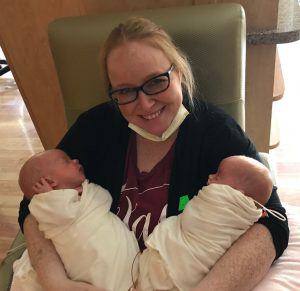 After discharge, Tracey began adjusting to her new life with babies in the NICU. The Klinge twins were in the NICU for nine days and then spent 5 weeks in the hospital’s Special Care Nursery. She would go back and forth from Frisco to Texas Health Dallas every day to spend time with Heidi and Hudson. “All the nurses cared for Heidi and Hudson like they were their own, and I can’t thank them enough,” Tracey remembered.
After discharge, Tracey began adjusting to her new life with babies in the NICU. The Klinge twins were in the NICU for nine days and then spent 5 weeks in the hospital’s Special Care Nursery. She would go back and forth from Frisco to Texas Health Dallas every day to spend time with Heidi and Hudson. “All the nurses cared for Heidi and Hudson like they were their own, and I can’t thank them enough,” Tracey remembered.
The twins are about to turn one and for their upcoming birthday, the Klinges plan to do a superhero-themed Birthday Buddies fundraiser, to raise money for all their healthcare heroes that cared for them at Texas Health Dallas. Birthday Buddies is a special program offered by the Texas Health Resources Foundation that helps NICU graduates ask family and friends for donations in lieu of gifts at their first birthday party to give back to their NICU.
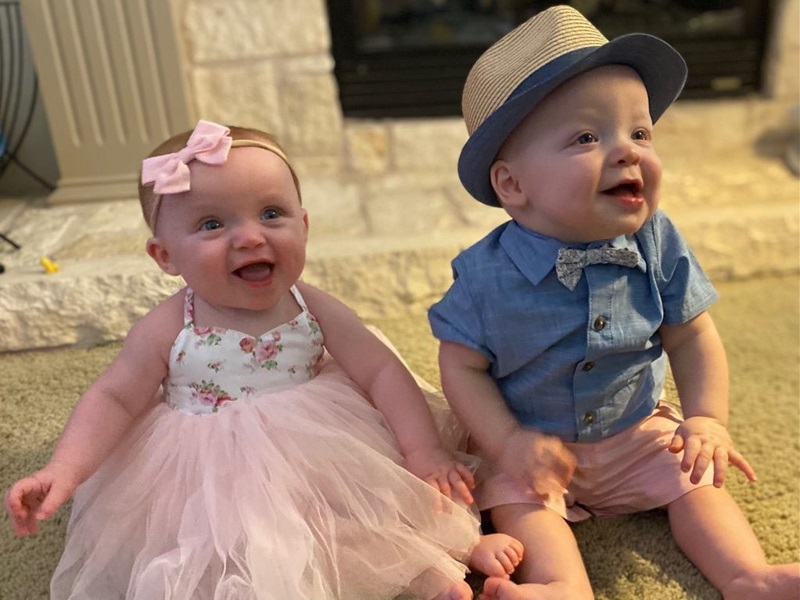
Baby Heidi and Baby Hudson
Money raised by Birthday Buddies is used to support the greatest needs of their NICU’s, and have helped with projects such the NICU renovation project, purchase new refrigerators for expressed breast milk, purchase new isolette covers to promote infant growth, purchase thermometers for each bed, etc. All things that help make the experience easier for the care givers and families.
To learn more about maternal care at Texas Health, visit TexasHealth.org/Health-and-Wellness/Women-and-Infants.

